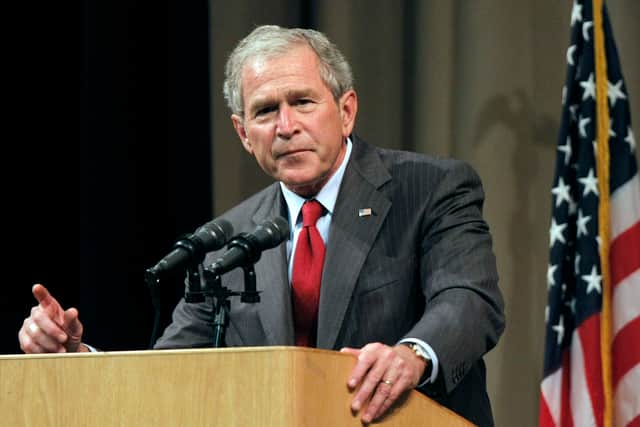What is a Freudian slip? Meaning of the term and George W Bush’s Iraq War speech blunder - explained
and live on Freeview channel 276
Former US President George W Bush made a Freudian slip whilst addressed an event in Dallas Texas.
The former president, who was giving a talk on the importance of fair elections, accidently referenced Iraq, when talking about Russia’s invasion of Ukraine.
Advertisement
Hide AdAdvertisement
Hide AdBush, who looked visibly shaken following the mix-up went on to clarify it was due to his age.
The War in Iraq began in 2003, after allegations that weapons of mass destruction posed a threat to the West.
However, this proved to be incorrect and lead the Iraq Inquiry from 2009-2011.
But was there any reason behind Bush accidently saying Iraq and what does a Freudian slip mean?
Here’s everything you need to know.
Advertisement
Hide AdAdvertisement
Hide AdWhat is a Freudian slip?
A Freudian slip is when someone accidentally says something they didn’t mean.
It is also known as a parapraxis or slip of the tongue.
They don’t often have a meaning behind them and can often just happen by accident.
They can materialise through speech or movement.
One common example of a Freudian slip would be when a child accidentally calls their teacher mum.
Why is it called a Freudian slip?
The name Freudian slip comes from the Austrian neurologist Sigmund Freud.
Advertisement
Hide AdAdvertisement
Hide AdFreud is often looked at as the founder of modern psychology and his theories still influences mental health treatment to this day.
He theorised that these slips, also known as parapraxis, were linked to the unconscious mind and revealed secret thoughts and feelings.
What did George Bush say about the Iraq War?
Bush was giving a speech at an event in Dallas, Texas, where he was talking about the importance of fair elections.


He tried to call out President Putin’s invasion of Ukraine, only it didn’t go that way.
Advertisement
Hide AdAdvertisement
Hide AdInstead of mentioning Ukraine, the former president referred to Iraq, a country he had previously controversially invaded in the early 2000s.
Bush said: "The decision of one man to launch a wholly unjustified and brutal invasion of Iraq... I mean of Ukraine".
After he had uttered the phrase, Bush made a face, recognising his mistake and referenced his age of 75, to explain the mistake.
When was the Iraq War?
The war in Iraq began in March 2003 and lasted until December 2011.
Advertisement
Hide AdAdvertisement
Hide Ad

Troops from the US, UK, Australia and Poland invaded the nation due to supposed weapons of mass destruction (WMD) and to overthrow Iraqi dictator Sadam Hussein.
After the invasion, it was proved that the allegations of WMD were incorrect and that any WMD may have had, were destroyed by Hussein a decade beforehand.
According to the Watson Institute at Brown University, since the invasion between 184,382 and 207,156 Iraqi civilians have been killed.
In the UK, an inquiry was held into the Iraq War, also known as the Chilcot report.
Advertisement
Hide AdAdvertisement
Hide AdThe findings, which were published in 2011 found that then Prime Minister Tony Blair had exaggerated the threat that Iraq posed against the UK.
It also uncovered that British intelligence agencies had "not established beyond doubt" whether Hussein had WMD.
The fallout left a lasting legacy on the people of Iraq and stability of the Middle East as a whole.
Comment Guidelines
National World encourages reader discussion on our stories. User feedback, insights and back-and-forth exchanges add a rich layer of context to reporting. Please review our Community Guidelines before commenting.
